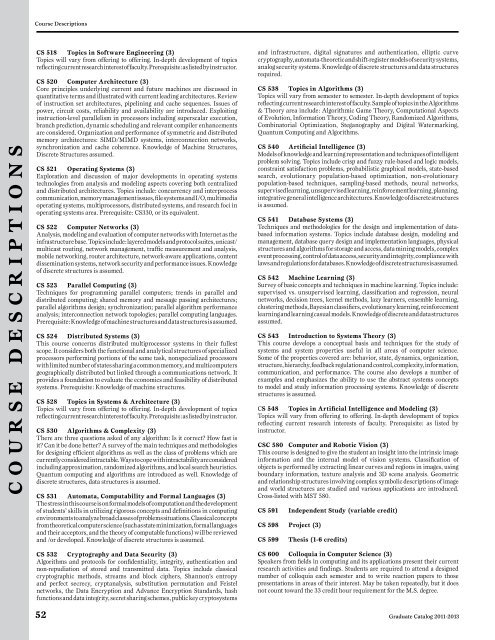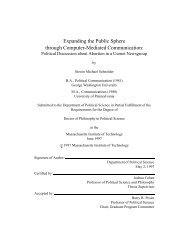Graduate Catalog 2011-2013 - SUNY Institute of Technology
Graduate Catalog 2011-2013 - SUNY Institute of Technology
Graduate Catalog 2011-2013 - SUNY Institute of Technology
Create successful ePaper yourself
Turn your PDF publications into a flip-book with our unique Google optimized e-Paper software.
Course Descriptions<br />
COURSE DESCRIPTIONS<br />
CS 518 Topics in S<strong>of</strong>tware Engineering (3)<br />
Topics will vary from <strong>of</strong>fering to <strong>of</strong>fering. In-depth development <strong>of</strong> topics<br />
reflecting current research interest <strong>of</strong> faculty. Prerequisite: as listed by instructor.<br />
CS 520 Computer Architecture (3)<br />
Core principles underlying current and future machines are discussed in<br />
quantitative terms and illustrated with current leading architectures. Review<br />
<strong>of</strong> instruction set architectures, pipelining and cache sequences. Issues <strong>of</strong><br />
power, circuit costs, reliability and availability are introduced. Exploiting<br />
instruction-level parallelism in processors including superscalar execution,<br />
branch prediction, dynamic scheduling and relevant compiler enhancements<br />
are considered. Organization and performance <strong>of</strong> symmetric and distributed<br />
memory architectures: SIMD/MIMD systems, interconnection networks,<br />
synchronization and cache coherence. Knowledge <strong>of</strong> Machine Structures,<br />
Discrete Structures assumed.<br />
CS 521 Operating Systems (3)<br />
Exploration and discussion <strong>of</strong> major developments in operating systems<br />
technologies from analysis and modeling aspects covering both centralized<br />
and distributed architectures. Topics include: concurrency and interprocess<br />
communication, memory management issues, file systems and I/O, multimedia<br />
operating systems, multiprocessors, distributed systems, and research foci in<br />
operating systems area. Prerequisite: CS330, or its equivalent.<br />
CS 522 Computer Networks (3)<br />
Analysis, modeling and evaluation <strong>of</strong> computer networks with Internet as the<br />
infrastructure base. Topics include: layered models and protocol suites, unicast/<br />
multicast routing, network management, traffic measurement and analysis,<br />
mobile networking, router architecture, network-aware applications, content<br />
dissemination systems, network security and performance issues. Knowledge<br />
<strong>of</strong> discrete structures is assumed.<br />
CS 523 Parallel Computing (3)<br />
Techniques for programming parallel computers; trends in parallel and<br />
distributed computing; shared memory and message passing architectures;<br />
parallel algorithms design; synchronization; parallel algorithm performance<br />
analysis; interconnection network topologies; parallel computing languages.<br />
Prerequisite: Knowledge <strong>of</strong> machine structures and data structures is assumed.<br />
CS 524 Distributed Systems (3)<br />
This course concerns distributed multiprocessor systems in their fullest<br />
scope. It considers both the functional and analytical structures <strong>of</strong> specialized<br />
processors performing portions <strong>of</strong> the same task, nonspecialized processors<br />
with limited number <strong>of</strong> states sharing a common memory, and multicomputers<br />
geographically distributed but linked through a communications network. It<br />
provides a foundation to evaluate the economics and feasibility <strong>of</strong> distributed<br />
systems. Prerequisite: Knowledge <strong>of</strong> machine structures.<br />
CS 528 Topics in Systems & Architecture (3)<br />
Topics will vary from <strong>of</strong>fering to <strong>of</strong>fering. In-depth development <strong>of</strong> topics<br />
reflecting current research interest <strong>of</strong> faculty. Prerequisite: as listed by instructor.<br />
CS 530 Algorithms & Complexity (3)<br />
There are three questions asked <strong>of</strong> any algorithm: Is it correct? How fast is<br />
it? Can it be done better? A survey <strong>of</strong> the main techniques and methodologies<br />
for designing efficient algorithms as well as the class <strong>of</strong> problems which are<br />
currently considered intractable. Ways to cope with intractability are considered<br />
including approximation, randomized algorithms, and local search heuristics.<br />
Quantum computing and algorithms are introduced as well. Knowledge <strong>of</strong><br />
discrete structures, data structures is assumed.<br />
CS 531 Automata, Computability and Formal Languages (3)<br />
The stress in this course is on formal models <strong>of</strong> computation and the development<br />
<strong>of</strong> students’ skills in utilizing rigorous concepts and definitions in computing<br />
environments to analyze broad classes <strong>of</strong> problems situations. Classical concepts<br />
from theoretical computer science (such as state minimization, formal languages<br />
and their acceptors, and the theory <strong>of</strong> computable functions) will be reviewed<br />
and /or developed. Knowledge <strong>of</strong> discrete structures is assumed.<br />
and infrastructure, digital signatures and authentication, elliptic curve<br />
cryptography, automata-theoretic and shift-register models <strong>of</strong> security systems,<br />
analog security systems. Knowledge <strong>of</strong> discrete structures and data structures<br />
required.<br />
CS 538 Topics in Algorithms (3)<br />
Topics will vary from semester to semester. In-depth development <strong>of</strong> topics<br />
reflecting current research interest <strong>of</strong> faculty. Sample <strong>of</strong> topics in the Algorithms<br />
& Theory area include: Algorithmic Game Theory, Computational Aspects<br />
<strong>of</strong> Evolution, Information Theory, Coding Theory, Randomized Algorithms,<br />
Combinatorial Optimization, Steganography and Digital Watermarking,<br />
Quantum Computing and Algorithms.<br />
CS 540 Artificial Intelligence (3)<br />
Models <strong>of</strong> knowledge and learning representation and techniques <strong>of</strong> intelligent<br />
problem solving. Topics include crisp and fuzzy rule-based and logic models,<br />
constraint satisfaction problems, probabilistic graphical models, state-based<br />
search, evolutionary population-based optimization, non-evolutionary<br />
population-based techniques, sampling-based methods, neural networks,<br />
supervised learning, unsupervised learning, reinforcement learning, planning,<br />
integrative general intelligence architectures. Knowledge <strong>of</strong> discrete structures<br />
is assumed.<br />
CS 541 Database Systems (3)<br />
Techniques and methodologies for the design and implementation <strong>of</strong> databased<br />
information systems. Topics include database design, modeling and<br />
management, database query design and implementation languages, physical<br />
structures and algorithms for storage and access, data mining models, complex<br />
event processing, control <strong>of</strong> data access, security and integrity, compliance with<br />
laws and regulations for databases. Knowledge <strong>of</strong> discrete structures is assumed.<br />
CS 542 Machine Learning (3)<br />
Survey <strong>of</strong> basic concepts and techniques in machine learning. Topics include:<br />
supervised vs. unsupervised learning, classification and regression, neural<br />
networks, decision trees, kernel methods, lazy learners, ensemble learning,<br />
clustering methods, Bayesian classifiers, evolutionary learning, reinforcement<br />
learning and learning casual models. Knowledge <strong>of</strong> discrete and data structures<br />
assumed.<br />
CS 543 Introduction to Systems Theory (3)<br />
This course develops a conceptual basis and techniques for the study <strong>of</strong><br />
systems and system properties useful in all areas <strong>of</strong> computer science.<br />
Some <strong>of</strong> the properties covered are: behavior, state, dynamics, organization,<br />
structure, hierarchy, feedback regulation and control, complexity, information,<br />
communication, and performance. The course also develops a number <strong>of</strong><br />
examples and emphasizes the ability to use the abstract systems concepts<br />
to model and study information processing systems. Knowledge <strong>of</strong> discrete<br />
structures is assumed.<br />
CS 548 Topics in Artificial Intelligence and Modeling (3)<br />
Topics will vary from <strong>of</strong>fering to <strong>of</strong>fering. In-depth development <strong>of</strong> topics<br />
reflecting current research interests <strong>of</strong> faculty. Prerequisite: as listed by<br />
instructor.<br />
CSC 580 Computer and Robotic Vision (3)<br />
This course is designed to give the student an insight into the intrinsic image<br />
information and the internal model <strong>of</strong> vision systems. Classification <strong>of</strong><br />
objects is performed by extracting linear curves and regions in images, using<br />
boundary information, texture analysis and 3D scene analysis. Geometric<br />
and relationship structures involving complex symbolic descriptions <strong>of</strong> image<br />
and world structures are studied and various applications are introduced.<br />
Cross-listed with MST 580.<br />
CS 591<br />
Independent Study (variable credit)<br />
CS 598 Project (3)<br />
CS 599<br />
Thesis (1-6 credits)<br />
CS 532 Cryptography and Data Security (3)<br />
Algorithms and protocols for confidentiality, integrity, authentication and<br />
non-repudiation <strong>of</strong> stored and transmitted data. Topics include classical<br />
cryptographic methods, streams and block ciphers, Shannon’s entropy<br />
and perfect secrecy, cryptanalysis, substitution permutation and Feistel<br />
networks, the Data Encryption and Advance Encryption Standards, hash<br />
functions and data integrity, secret sharing schemes, public key cryptosystems<br />
CS 600 Colloquia in Computer Science (3)<br />
Speakers from fields in computing and its applications present their current<br />
research activities and findings. Students are required to attend a designed<br />
number <strong>of</strong> colloquia each semester and to write reaction papers to those<br />
presentations in areas <strong>of</strong> their interest. May be taken repeatedly, but it does<br />
not count toward the 33 credit hour requirement for the M.S. degree.<br />
52 <strong>Graduate</strong> <strong>Catalog</strong> <strong>2011</strong>-<strong>2013</strong>
















